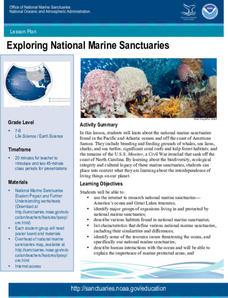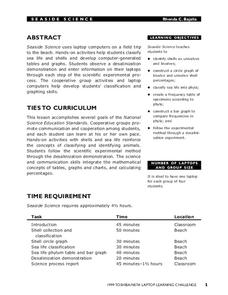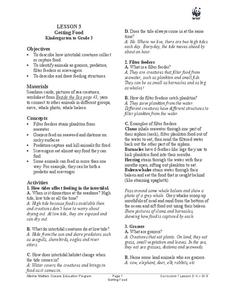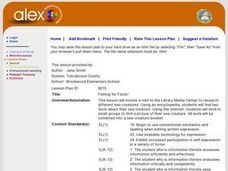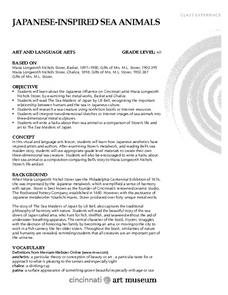National Wildlife Federation
Planning Your Research
Make it a great proposal! Class members play the role of marine scientists and choose from a variety of whales considered endangered they would like to study. Scholars then create applications for permits to conduct research of the...
Nature Works Everywhere
Sharks and Shorelines
Examine predator-prey marine relationships through an interactive lesson design. Learners begin by studying a specific shark species and then analyze real-time shark-tracking data. They also study threats to shark populations and...
NOAA
Watch the Screen!
Can a sponge cure cancer? Life science pupils visit the drugstore under the sea in the fifth lesson of six. Working groups research the topic then get hands-on experience by testing the inhibiting effects of several plant extracts on E....
Curated OER
Ocean Life: A Heavy Subject
Second graders examine The Learning Page Fact Files about ocean life and categorize the data by weight and group. They distinguish between fish, mammals, and invertebrates and which weigh the most and the least. Students record their...
Curated OER
Exploring National Marine Sanctuaries
Middle schoolers conduct Internet research of the living organisms in national marine sanctuaries, and the resources protected in the sanctuaries. Students gather information about each of the sanctuaries and make an oral presentation...
Curated OER
Seaside Science
Students research sea life using laptop computers. In this sea life lesson, students participate in a field trip to the beach and enter observations into their laptop computers. Students classify shells and sea life.
Curated OER
SeaWorld: Education, Entertainment, or Exploitation?
Students discuss SeaWorld, research marine animal biology, investigate one animal currently collected by SeaWorld, and decide whether they oppose or support SeaWorld's collection policy. Students then gather information relating to...
Curated OER
Do You Have a Sinking Feeling
Students determine how marine archaeologists use historical and archaeological data to draw inferences about shipwrecks. Students plot the position of a shipwrecked vessel, and draw inferences about the shipwreck from artifacts that have...
Curated OER
Getting Food
Students complete activities to learn about the ocean food web. In this ocean life lesson, students discuss how the tides affect feeding, learn about filter feeders, grazers, predators, and scavengers. Students then group the animals...
Curated OER
Problem Based Learning Scenario
Students research about the function of MPA's. In this marine science lesson, students explore how humans influence changes near these areas. They explore different MPA's in the Great Lakes region.
Curated OER
Fishing for Facts!
First graders visit the library or media center to research sea creatures using encyclopedia. They find two facts and research the Internet to find a picture of the sea creature. They create a class sea creature booklet.
Curated OER
Shipwreck Mystery
Students draw inferences about a shipwreck. In this marine archaeologist lesson, students examine historical and archaeological data to draw inferences about the age and identity of shipwrecks.
American Museum of Natural History
They Glow!
Would you believe marine animals can make their own light? An online resource describes the process of bioluminescence and how animals in the ocean use it to survive. The lesson features a catchy tune that describes the behavior of ocean...
Curated OER
Effects of Oil Spills on Environment and Marine Life
Learners explore oceanography by conducting an environmental experiment in class. In this oil spill instructional activity, students discuss the human need for oil and what is at stake when we drill for oil in our oceans. Learners read a...
Curated OER
Ecosystems
A critical look into the structure and function of ecosystems is here for young learners as a series of lessons and worksheet activities. Topics covered include land-based and marine ecosystems, connections to the water cycle, food webs,...
Curated OER
Marine & Aquatic Habitats Activities - Terrestrial Forests vs. Kelp Forests
Students discuss concept and specificity of habitats, both marine and terrestrial, list similarities and differences in the habitats of a kelp forest and a terrestrial forest, compare types of organisms that occupy corresponding types of...
Curated OER
Marine & Aquatic Habitats Activities - Creatures in the Coral
Students describe unique adaptations of organisms that live in the coral reef habitat, read various books pertaining to coral reefs and ocean life, and construct a wheel demonstrating the relationships between certain coral reef...
Curated OER
Marine Debris
Students will perform experiments to examine if debris will float, or blow in the wind. They discuss the effects of these characteristics on marine debris.
Curated OER
Conserving Marine Life
Students discuss the different threats to various marine life. Through research, groups examine threats to specific marine life, evaluate the situation, and develop possible solutions to help marine life regain stability. Conservation...
Curated OER
Japanese-Inspired Sea Animals
Learners explore the Japanese influence on Cincinnati artist Maria Longworth Nichols Storer, by examining her metal works, Basket and Chalice. They research a sea creature using nonfiction books or Internet resources. Students write a...
Curated OER
Importance of Marine Protected Areas: an Overfishing Simulation
Students simulate overfishing by conducting a guided experiment in the classroom. In this ecology lesson, students discuss the environmental consequences of overfishing. They research additional information about the issue and share...
Curated OER
How Harmful Is It?
Young scholars complete a form that requires them to make decisions about how severely different types of marine debris affect people, animals, vessels, communities. Results are totaled and analyzed to determine which types of marine...
American Museum of Natural History
Ocean Creature Feature
From coloring to hard protective shells, ocean creatures have adaptation features that help them survive. An eight-question online quiz highlights different ocean animals and their unique characteristics. The resource then offers pop-up...
Curated OER
How Diverse is That?
Compare various types of biological diversity in a coral reef and calculate a numeric indicator that describes the diversity found in coral communities. Your class can work in groups to look at the abundance and distribution data of...






